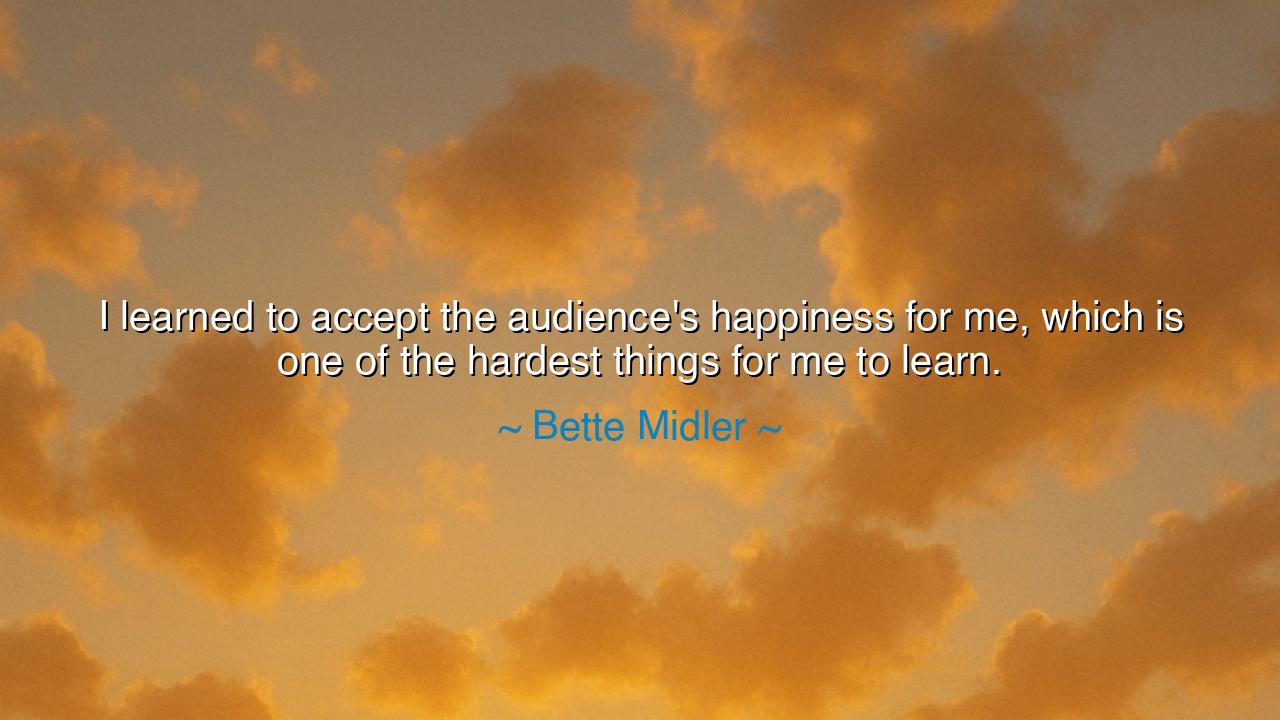
I learned to accept the audience's happiness for me, which is one
I learned to accept the audience's happiness for me, which is one of the hardest things for me to learn.






In the words of Bette Midler, “I learned to accept the audience’s happiness for me, which is one of the hardest things for me to learn.” Within this confession lies a rare and tender truth — that sometimes the greatest challenge is not to give love, but to receive it. To stand in the light of others’ joy and believe oneself worthy of it is no small task. The human heart, though eager to please, often trembles before praise. It is easy to chase approval, but far harder to accept admiration with grace, to believe that the affection directed toward us is not illusion, but genuine gratitude.
Bette Midler, a performer whose life has been woven into the fabric of stage and song, speaks here not as a star, but as a soul who has walked through doubt. The performer’s path is lined with applause — yet within that applause often echoes uncertainty. Many who live before audiences, whether on stages or in smaller moments of life, struggle to believe that the happiness others feel for them is sincere. Midler’s words reveal a kind of humility that becomes a burden — the unwillingness to see oneself as deserving of others’ joy. It is a lesson hard won, for it requires the soul to surrender self-judgment and open to the truth that love freely given should also be freely received.
The ancients would have recognized this struggle. They called it the battle between pride and humility, but beneath both lies a deeper enemy: unworthiness. The Stoics, who prized modesty, also warned that rejecting honor can be as vain as seeking it. To refuse joy offered by others is to deny them the gift of giving. Thus, the wise learned to bow not in false modesty, but in grateful acceptance. To say, “Thank you for your happiness in my success,” is not arrogance, but an act of courage. For the heart that can receive love is the heart that can truly return it.
Consider the story of Vincent van Gogh, whose art now adorns the halls of the world but whose life was steeped in solitude. He painted to share the fire within him, yet when praise came too late, he could not bear it. He longed to be understood, but he could not imagine being celebrated. His tragedy was not in his talent, but in his inability to believe in others’ joy for him. Bette Midler’s words are, in some sense, a redemption of that story — a triumph over the shadow that whispers, “You are not enough.” To learn to accept happiness from others is to reclaim the bridge between self and world, to see that one’s light is not selfish, but shared.
In truth, there is a quiet heroism in receiving. The warrior who conquers lands may be admired, but the soul who learns to receive kindness without fear has conquered something greater — the self-doubt that divides humanity. When we allow others to be happy for us, we become mirrors in which they see their own hope reflected. Our joy gives them permission to feel joy. Our success, received humbly, becomes their inspiration. To reject that is to close the circle of human connection; to accept it is to complete it.
There is also a spiritual lesson here: that happiness is communal, not solitary. We are not meant to hoard our victories or hide from our admirers. The joy of another person’s success is a spark that lights our own. When Midler learned to accept her audience’s happiness, she was not only honoring herself — she was honoring them. In that moment of acceptance, giver and receiver became one, bound by the shared radiance of joy. It is the same truth the ancients spoke of when they said that to receive a gift with grace is the highest form of giving.
So let this be the teaching for those who walk through life doubting their worth: Do not flee from praise. Do not shrink from joy given to you. To receive love is not vanity, but reverence — for love must circulate to live. When another rejoices in your light, let them. When they clap for your song, bow not from discomfort, but from gratitude. To deny their joy is to deny the beauty of connection itself.
Therefore, remember Bette Midler’s wisdom: learning to accept the happiness of others for you is not a small lesson — it is a lifelong art. It requires the strength to see yourself through eyes of kindness, the humility to honor others’ goodwill, and the grace to believe that joy shared is joy multiplied. For in the great symphony of life, applause is not meant to be deflected; it is meant to be felt — deeply, honestly, and with open arms.






AAdministratorAdministrator
Welcome, honored guests. Please leave a comment, we will respond soon